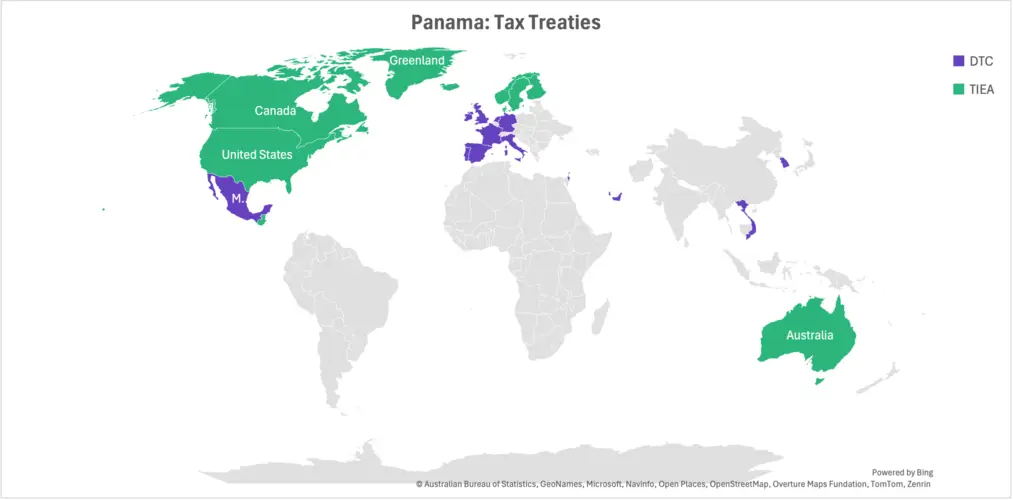When setting up a company in Panama, you will have access to a wide range of legal forms and business types to suit different business needs.
Popular legal structures for companies in Panama
The Panamanian jurisdiction offers several options for legal structures, of which the following are the most popular:
Corporation (Sociedad Anónima – SA)
A corporation in Panama is similar to a public limited company. Its creation requires from three to 50 founders, who can be of any nationality. The main advantage is that shares can be issued, and the liability of the shareholders is limited to their contribution. This structure is suitable for large companies planning to raise capital through the sale of shares.
Closed Joint Stock Company (Sociedad Anónima Cerrada, SAC)
This is a form of corporation with limited transfer of shares. The shares cannot be freely traded on the open market, and their transfer often requires the consent of the other shareholders. This type of company is suitable for family businesses or organizations where shareholders want to control share ownership and prevent outside influence.
Limited Liability Company (Sociedad de Responsabilidad Limitada – SRL)
SRL is popular among small and medium-sized businesses. It requires two to five founders, and their liability is limited to the amount of funds invested. SRL provides flexibility in management and profit distribution, making it suitable for entrepreneurs seeking protection of personal assets and flexibility in the business structure.
Sole proprietorship
This is the simplest type of business owned by one person. Sole proprietors are fully responsible for the business, including its debts and liabilities. This structure is suitable for small businesses and self-employed individuals who want to manage their businesses directly.
Private Interest Fund (Fundación de Interés Privado)
This structure is often used for personal asset management and inheritance planning. The fund protects assets from creditors and other risks while ensuring confidentiality. It is not intended for commercial activities but can be used for charitable or personal purposes.
Non-profit organizations (Fundaciones sin Fines de Lucro).
These organizations are created for charitable, educational, or religious purposes. They are exempt from income tax in Panama, which makes them favorable for those who want to carry out socially significant activities without a commercial purpose.
International Business Companies (IBC).
International Business Companies (IBCs) are a popular form of offshore structure in Panama for international operations. These companies are exempt from taxes on income earned outside of Panama, making them particularly attractive for international business. IBCs can have one founder and one director, who can be individuals or entities of any nationality.
The advantage of an IBC is complete confidentiality and flexibility in management. This structure is suitable for companies engaged in international trade asset ownership and for those seeking legal protection and a reduced tax burden.
When deciding whether to incorporate a company in Panama, several factors need to be considered, including the specifics of the business activity, the number of founders, the degree of liability of the participants, and the tax implications.
Types of business in Panama
Panama offers a wide range of opportunities for establishing and operating various types of business activities:
Holding
A holding company manages stakes in other companies, thus creating a business group. The main purpose of such a business is to own and control subsidiaries, investments, or other assets, thus optimizing management and reducing the tax burden. Holding companies are popular among international investors because Panama does not tax income earned outside the country.
Trust
Trust companies in Panama are created to protect and manage assets for the benefit of beneficiaries. A trust allows assets to be transferred to a third party (trustee) for management for protection from creditors, division of assets, and privacy.
The advantage of trusts is the high level of asset protection and the ability to preserve the anonymity of the owner. This structure is suitable for individuals who wish to protect their assets and ensure that they are passed on through inheritance.
Financial Services
Financial companies in Panama can provide services in the areas of banking, insurance, and investment. The jurisdiction offers a well-developed financial infrastructure and favorable legislation for such organizations. Panama’s banking system is one of the most stable in the region, and privacy laws help protect personal and corporate information.
The advantage of financial services in Panama is the opportunity to operate in a stable economy with minimal tax obligations. This form of business is suitable for international banks, insurance companies, and investment funds.
Asset Management
Asset management companies in this jurisdiction are engaged in investing and managing financial portfolios for clients, including stocks, bonds, and real estate. Panama is an attractive jurisdiction for such companies due to its tax regime and high standards of confidentiality.
The advantage of asset management in Panama is the ability to work with international clients and minimize taxes on income earned abroad. Suitable for private and corporate investors who wish to manage capital efficiently.
E-commerce
E-commerce is the sale of goods and services over the Internet. Panama provides a favorable environment for startups and online companies due to the lack of taxation on income earned outside the country and high privacy.
The advantages of e-commerce in Panama are low operating costs, no taxation on outside income, and the ability to reach a global audience. Suitable for owners of online stores, IT companies, and startups focused on international markets.
Company Types
| Corporation (S.A.) |
Most common form; limited liability; flexible structure. |
| Limited Liability Company (LLC) |
Suitable for small businesses; fewer formalities. |
| Partnership |
General and limited partnerships are allowed. |
| Branch Office |
Foreign companies can establish a branch in Panama. |


